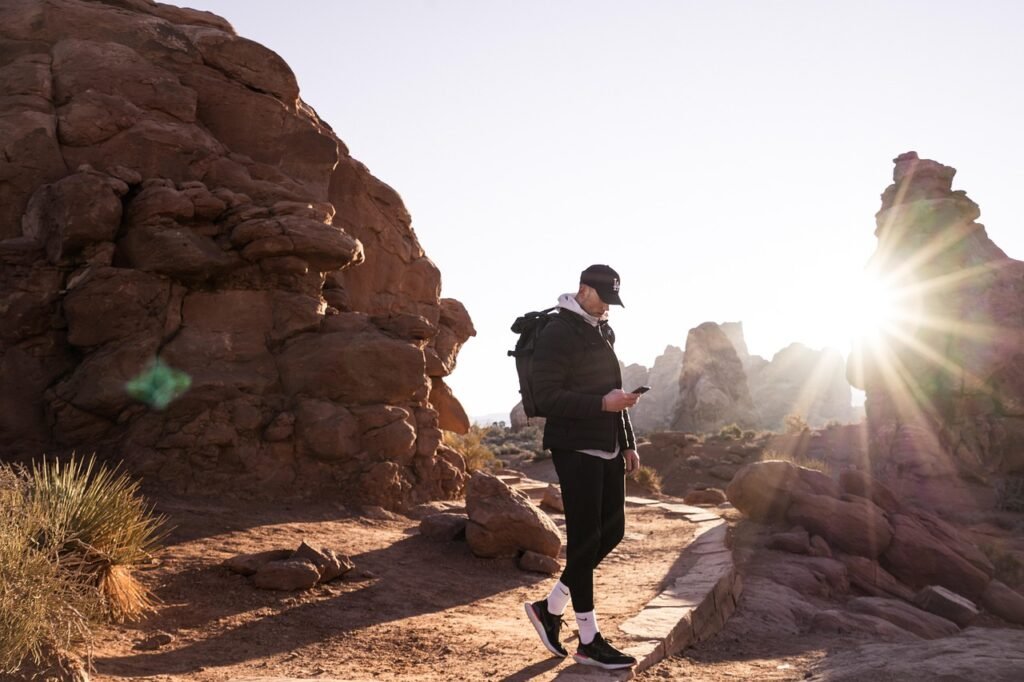What to Wear Hiking in Hot Weather
Knowing what to wear hiking in hot weather is essential for comfort, safety, and endurance. Hot temperatures, sun exposure, and humidity can turn a great hike into a dangerous ordeal without the right gear. From moisture-wicking fabrics to sun protection, this guide breaks down exactly how to dress for hot-weather hikes.
Explore our recommended hot-weather hiking gear here before your next trip.

Table of Contents
- 1. Why Fabric Choice Matters
- 2. Best Shirts and Tops
- 3. Shorts vs. Pants for Hot Hikes
- 4. Proper Footwear and Socks
- 5. Essential Accessories for Sun Protection
- 6. Common Clothing Mistakes to Avoid
1. Why Fabric Choice Matters
The best clothing for hot-weather hiking is made from breathable, moisture-wicking fabrics. Cotton should be avoided as it retains moisture and causes chafing. Instead, choose synthetic materials like polyester or nylon, or natural fibers like merino wool designed for hot climates.
2. Best Shirts and Tops
Lightweight, long-sleeve shirts made from synthetic or merino wool offer a balance of sun protection and ventilation. Look for shirts labeled “UPF-rated” for added UV defense. Button-up hiking shirts with rollable sleeves and mesh panels provide excellent airflow and flexibility on the trail.
3. Shorts vs. Pants for Hot Hikes
Convertible pants are a smart choice if you’re unsure what to wear hiking in hot weather. Shorts keep you cool, but pants offer protection from brush, insects, and UV rays. Choose pants with zip vents or made of stretch-woven materials for breathability.
4. Proper Footwear and Socks
Trail runners or ventilated hiking shoes are ideal for hot-weather hiking. Avoid waterproof membranes unless hiking through streams—they reduce breathability. Pair them with lightweight, moisture-wicking socks made from synthetic fibers or merino wool to prevent blisters and hot spots.
5. Essential Accessories for Sun Protection
- Wide-brim hat or cap: Shields your face, ears, and neck from UV rays
- Sunglasses: Look for polarized lenses with UV protection
- Neck gaiter or bandana: Protects your neck and can be soaked in water for cooling
- Lightweight gloves: Optional, but great for desert terrain or extra sun protection
Apply sunscreen to exposed skin, especially your hands, ears, and the back of your neck, and reapply every two hours.
6. Common Clothing Mistakes to Avoid
- Wearing dark-colored clothing that absorbs heat
- Choosing cotton instead of performance fabrics
- Skipping sun-protective clothing and accessories
- Wearing waterproof boots in hot, dry conditions
Final Thoughts
Understanding what to wear hiking in hot weather helps you stay cool, dry, and protected. Prioritize breathable fabrics, sun protection, and moisture management. The right gear can turn a grueling hike into a refreshing adventure, even in triple-digit heat.
Learn More
For more hot-weather hiking safety tips, visit the National Park Service guide on hiking in heat.
Frequently Asked Questions
Should I wear long sleeves when hiking in hot weather?
Yes, long sleeves made of breathable, UPF-rated materials protect you from sunburn and dehydration without overheating you.
Are cotton shirts okay for summer hiking?
No, cotton holds sweat and dries slowly, increasing your risk of chafing. Choose moisture-wicking synthetic or merino wool shirts instead.
What color clothes are best for hot-weather hiking?
Light-colored clothing reflects sunlight and helps keep you cooler. Avoid dark colors, which absorb heat and raise your core temperature.
Can I wear trail running shoes instead of hiking boots?
Absolutely. Trail runners are often lighter and more breathable, making them a great choice for dry, warm-weather hikes with lighter packs.
